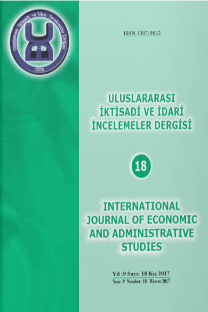MACROECONOMIC UNCERTAINTY AND PRIVATE INVESTMENT: THE CASE OF POLAND
Özel Yatırımlar, Enflasyon Belirsizliği, Döviz Kuru Belirsizliği, Sınır Testi
MACROECONOMIC UNCERTAINTY AND PRIVATE INVESTMENT: THE CASE OF POLAND
___
- Abel, A. B. (1983). Optimal Investment under Uncertainty. American Economic Review, 73, 228–33.
- Bollerslev, T. (1986). Generalized Autoregressive Conditional Heteroskedasticity. Journal of Econometrics, 31, 307-327.
- Byrne, J.P. and Davis, E.P. (2005). Investment and Uncertainty in the G7. Review of World Economics, 141(1), 1-32.
- Darby, J., Hallett, A.H., Ireland, J. and Piscitelli, L. (1999). The Impact of Exchange Rate Uncertainty on the level of Investment. Economic Journal, 109, C55-C67.
- Demir, F. (2009). Macroeconomic Uncertainty and Private Investment in Argentina, Mexico and Turkey, Applied Economics Letters, 16(6), 567-571.
- Dixit, A., Pindyck, R. (1994). Investment Under Uncertainty, Princeton, NJ: Princeton University Press.
- Easterly, W., Islam, R. and Stiglitz, J. (2000). Explaining Growth Volatility. In Annual World Bank Conference on Development Economics 2000, Oxford University Press.
- Eberly, J. (1993). Comment on Pindyck and Solimano. NBER Macroeconomics Annual, 303-312.
- Engle, R. F., Granger, C.W.J. (1987). Cointegration and Error-correction: Representation, Estimation and Testing. Econometrica, 55(2), 251–276.
- Federer, J. (1993). The Impact of Uncertainty on Aggregate Investment Spending. Journal of Money, Credit and Banking, 25, 30–48.
- Ghura, D. and Grennes, T.J. (1993). The Real Exchange Rate and Macroeconomic Performance in Sub-Saharan Africa. Journal of Development Economics, 42(1), 155-174.
- Gilchrist, S., Sim, J.W. and Zakrajsek, E. (2014). Uncertainty, Financial Frictions, and Investment Dynamics. NBER Working Paper No: 20038.
- Grier, K. and Perry, M. (2000). The Effects of Real and Nominal Uncertainty on Inflation and Output Growth: Some GARCH-M Evidence. Journal of Applied Econometrics, 15(1), 45–58.
- Hartman, R. (1972). The Effects of Price and Cost Uncertainty on Investment. Journal of Economic Theory, 5, 258–66.
- Hasanov, M., Omay, T. (2011). The Relationship Between Inflation, Output Growth, and Their Uncertainties: Evidence from Selected CEE Countries. Emerging Markets Finance and Trade, 47(July), 5-20.
- Johansen, S. (1998). Statistical Analysis of Cointegration Vectors. Journal of Economic Dynamics and Control, 12(2-3). 231-54.
- Keynes, J. M. (1936). The General Theory of Employment, Interest and Money. San Diego: Harcourt Brace Jovanovich.
- Lee, J. (2016). The Impact of Idiosyncratic Uncertainty When Investment Opportunities are Endogenous. Journal of Economic Dynamics and Control, 65, 105–124.
- Lensink, R. (2002). Is the Uncertainty-investment Link Non-linear?” Review of World Economics, 138(1), 131-147.
- McDonald, R., Siegel, D. (1986). The Value of Waiting to Invest. Quarterly Journal of Economics, 101(4), 707–727.
- National Bank of Poland, (Quarterly Survey) (2005). Wstepna Informacja o Kondycji Sektora Przedsiebiorstw ze Szczegolnym Unwzglednieniem Stanu Konjunktury W 1 KW.
- Pesaran, M. H. and Shin, Y. (1999). An Autoregressive Distributed Lag Modelling Approach to Cointegration Analysis. S. Strom (eds.) Econometrics and Economic Theory in the 20th Century, The Ragnar Frisch Centennial Symposium, Cambridge University Press, Cambridge.
- Pesaran, M. H., Shin, Y. and Smith, R.J. (2001). Bounds Testing Approaches to the Analysis of Level Relationships. Journal of Applied Econometrics, 16(3), 289–326.
- Pindyck, R.S. (1991). Irreversibility, Uncertainty, and Investment. Journal of Economic Literature, 29(3), 1110–1148.
- Pindyck, R. S. and Solimano, A. (1993). Economic Instability and Aggregate Investment. NBER Macroeconomics Annual No: 8.
- Pradhan, G., Schuster, Z. and Upadhyaya, K.P. (2004). Exchange Rate Uncertainty and the Level of Investment in Selected South-East Asian Countries. Applied Economics, 36, 2161–2165.
- Saman, C. (2010). Macroeconomic Uncertainty and Investment: Empirical Analysis for Romania. Romanian Journal of Economic Forecasting, 2/2010, 155-164.
- Sarkar, S. (2000). On the Investment–uncertainty Relationship in a Real Options Model. Journal of Economic Dynamics and Control, 24, 219–25.
- Serven, L. (1998). Macroeconomic Uncertainty and Private Investment in ldcs: An Empirical Investigation. World Bank Policy Research Working Paper No: 2035.
- Serven, L. (2003). Real Exchange Rate Uncertainty and Private Investment in Developing Countries. Review of Economics and Statistics, 85(1), 212–217.
- Serven, L. and Solimano, A. (1993). Striving for Growth After Adjustment: The Role of Capital Formation. Washington DC: The World Bank.
- Tobin, J. (1969). A General Equilibrium Approach to Monetary Theory. Journal of Money, Credit, and Banking, 1(1), 15-29.
- Zeira, J. (1990). Cost Uncertainty and The Rate of Investment. Journal of Economic Dynamics and Control, 14, 53–63.
- ISSN: 1307-9832
- Yayın Aralığı: Yılda 4 Sayı
- Başlangıç: 2008
- Yayıncı: Kenan ÇELİK
ANALYSIS OF THE RELATIONSHIP BETWEEN INFLATION AND INTEREST RATES IN TURKEY: FOURIER APPROACH
ANALYSIS OF FOREIGN DIRECT INVESTMENT IN FOOD PROUCT SECTOR IN TURKEY
Fevziye KALIPÇI ÇAĞIRAN, İdris VARICI
ANALYSIS OF FOREIGN DIRECT INVESTMENT IN FOOD PRODUCT SECTOR IN TURKEY
Hasan AYAYDIN, Abdulkadir BARUT, Fahrettin PALA
CONSUMER SWITCHING BEHAVIOR IN BANKING INDUSTRY: CAN CONSUMER BASE BE PURCHASED, OR EARNED?
Mehmet Özer DEMİR, Zuhal GÖK DEMİR
CAUSALITY RELATIONSHIP BETWEEN FOREIGN DIRECT INVESTMENT AND TOURISM
SAĞLIK TURİZMİ POTANSİYELİNİN İNCELENMESİ: TRABZON İLİ
Gökhan YILMAZ, Ayten TURAN KURTARAN, Buğra YÜCESAN
YAŞAM TARZLARININ SOSYAL SORUMLU YATIRIM FON TERCİHİ ÜZERİNDEKİ ETKİSİ
Selim AREN, Rüya KAPLAN YILDIRIM
ENDÜSTRİ 4.0 BAKIŞ AÇISININ ÖĞRENCİLER GÖZÜNDEN TEKNOLOJİ KABUL MODELİ (TKM) İLE ÖLÇÜMÜ
